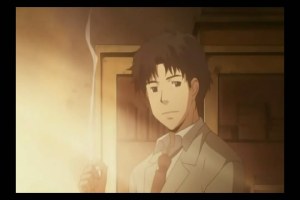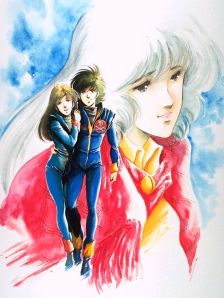Original post here: [->]
This one was fairly mind-blowing; perhaps it’s the absence of the other characters to balance out Suruga’s lightning delivery… but surprisingly enough I recall the “Monkey Paw” story that Araragi initially attributes to Suruga’s strange condition.
Depending on the version of the story, it involves a group of people finding/buying a dessicated monkey paw talisman that is said to grant three wishes. The first wish is for money, but one of the group’s number is killed as a result (for example, collecting a life insurance payout). One member of the distraught group then tries to wish the other person to life – which has no immediate effect… until several days after the funeral, where an ominous banging is heard on the door. The more sensible minded members of the group then burn the third wish to ensure that the deceased person stays properly dead – as it has been several days since the burial and who knows what horror is now shambling about.
The exact gory details vary on the version – sometimes it’s a family that discovers the paw in the belongings of a long lost relative, or a group of teenagers that steal it from a curio shop; sometimes the paw has three outstretched fingers which curl down as wishes are granted; but the general pattern of the story remains the same. The ultimate theme in the end is that the supernatural power of the three wishes, rather than allowing the group to change fate, causes them to be locked in – their second and third wishes are used up in various states of agonized regret over the results of the first choice.
Meme does point out that Araragi’s story is incorrect: not a monkey but a devil, but still the fact that the story is brought up still raises some interesting ideas. Much as in the original story, Suruga’s wishes are unable to change her ultimate fate; her wishes are made of regrets. She originally wished to help Senjougahara and solve her weight problem, but in the end that only resulted in alienating their relationship. Suruga’s subsequent “omoi” (as noted before, implying feelings, wishes, and weight), is to undo the damage she caused with her first wish, to try and restore what was lost.
Continued […]
To uh, re-iterate in TL:DR fashion,
-The pattern of Suruga’s wishes follows the original “Monkey Paw” story.
-Her first wish is to solve Senjougahara’s weight problem, after discovering it. She approaches Senjougahara, but this results in their relationship becoming alienated. However Senjougahara is indeed cured – just not by Suruga, rather, by Araragi.
-Her second wish is then to restore her previous relationship with Senjougahara – much like the original story, the second wish is made to reverse the consequences of the first. This however results in the manifestation of the “monkey paw” we see in this episode.
-Her third wish now is what Seinime articulates: She wants the monkey paw off her. Her third wish, as in the original Monkey Paw story, is based on the regret felt for the consequences of her second wish.
-This sequence exactly mirrors the pattern of the original Monkey Paw tale: a wish is made, but results in consequences. Rather than live on with the consequences, the protagonists try to reverse them – essentially trying to go back to “how things were before”.
-I predict for the next episode that Meme will point to the root of Suruga’s problems as an inability to move beyond the past, and emphasize the fact that she must live with the consequences of her actions.




August 9, 2009 at 3:00 am
I too was moved by this episode. I had flashbacks to the Sichuan Earthquake and the collapsing schools. Parents should never have to bury their own children, let alone dig them out of rubble.
What’s worse is the fact that these were government-built schools, and adjacent government offices did NOT collapse. Grief turned to anger and rage at the apparent corruption that had caused shoddy construction… and of course the Party then cracked down on them.
Also the Sichuan quake was in a remote area during the worst part of the rainy season. Help took weeks to arrive in many places. Not to mention that large amounts of aid were siphoned off by corrupt officials (or so the average citizen believes, anyway).
At least Mari, Mirai, and Yuuki don’t have to deal with any of that crap. In fact, so far we haven’t seen much of the ugly side of human nature at all. Some rudeness, a few selfish survivors, but no downright maliciousness. And the government response has obviously been well-prepared and highly-efficient. Humans have an amazing capacity to make a terrible tragedy worse, but our heroes are lucky enough to live in a relatively decent society where that doesn’t happen as much. If nothing else, that’s something for them to be thankful for.
August 9, 2009 at 3:17 am
I’m not that familiar with the recent earthquakes (China, Turkey, Iran come to mind).
Mike from Anime Diet shared this article in the comments section of the review I linked to above [->]
The aricle talks about how people can behave well in the face of calamity. It seems that the people of Tokyo are consistent with some of the observations in that TIME Magazine article. I do think that Mirai, Yuuki, and Mari have much to be thankful for.
Pardon my repeating what I said somewhere else,
In a addition to this, the narrative allows Mirai the latitude to empathize with the suffering of others, because there are no external threats in the form of malicious humans.
August 9, 2009 at 4:15 am
Thank you for the link! That was a fascinating and inspiring article.
I mentioned China because I was in the country at the time and knew people involved. It’s interesting to compare the circumstances there with the ones portrayed here. They’re very similar in some ways, but also dramatically different in others.
You’re right though. The absence of malice from survivors or government makes it possible for them to empathize with others. In a more hostile environment, such feelings would likely be replaced with wariness and suspicion. Touching scenes like the ones we had in this episode are possible because they aren’t threatened like that. And that is a good thing, I think.
Oh, and I really hope that their parents aren’t dead… I would probably cry. I wonder if we’ll find out next episode?
August 9, 2009 at 10:13 am
That must have been quite the experience, to have been in China in such a time. Were you anywhere near the affected area?
My only similar experience was way back when I was Mirai’s age in 1990, during Baguio Magnitude 7.8 [->].
Baguio City is about 8 hours by land North of Metro Manila where I live (the epicenter is actually closer, about 3-4 North by land). We were lucky to not have experienced structural damage in Metro Manila, despite feeling the earth shake violently in our classrooms, and in our homes during the many aftershocks. But Baguio was pretty much messed up.
We didn’t experience a societal collapse either in the localities most affected, instead our newspapers seemed very eager to report stories of heroism, valor, and survival just as the death tool numbers and the value of property destroyed.
My experience of the event is far distant to Mirai’s though, and I wouldn’t presume to have a special understanding of what she’s going through, beyond being a conflicted early adolescent.